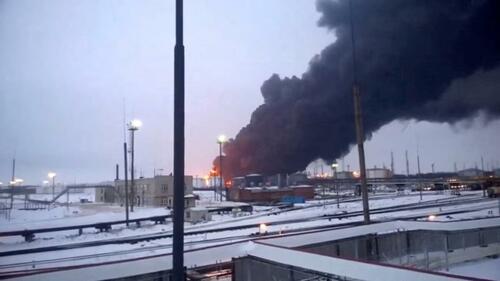After Russian President Vladimir Putin's post-election victory speech and Q&A with the press wherein he first unveiled the possibility of creating a buffer zone between Ukrainian land and Russian border regions, the Kremlin has issued more details of the plan being mulled.
Putin had initially described Sunday, "I do not exclude that, bearing in mind the tragic events taking place today, we will be forced at some point, when we deem it appropriate, to create a certain ‘sanitary zone’ in the territories today under the Kyiv regime." He referenced the "tragic events" of cross-border attacks in regions bordering Ukraine which have left scores of civilians dead and wounded over the past several months.
Putin described without elaborating further that the security zone "would be quite difficult for the adversary to overcome with its weapons, primarily of foreign origin."

On Monday, Kremlin spokesman Dmitry Peskov said that as part of the plan Russia "would take measures to safeguard [its] territories" from Ukrainian drone and artillery attacks on critical infrastructure and civilian areas and residences. These areas can be made safe, he explained in follow-up to Putin's words, "some kind of corridor, some kind of… buffer zone that [would put] out of reach any means that the enemy might use to launch strikes."
From Moscow's perspective, this is laying the foundation and likely even 'legal framework' for seizing and solidifying hold over border territories inside Ukraine for the purpose of creating this proposed buffer. In many cases thus far throughout the war, Ukraine forces have been able to send drones hundreds of kilometers inside Russia, reaching even Moscow and St. Petersburg in rare instances.
Oil refineries have been especially targeted, with a dozen or more instances in merely the last few months alone. Crimea too has come under increased drone swarm attack.
The attacks on energy are clearly beginning to have significant impact on a chief source of revenue, part of which no doubt goes to fund the Russian war machine in Ukraine.
"Gunvor Group Ltd. Chief Executive Officer Torbjörn Törnqvist estimates about 600,000 barrels of Russia’s daily oil-refining capacity has been knocked out by Ukrainian drone strikes," Bloomberg reports based on a Monday report. According to some key quotes:
“It is significant because obviously this is gonna hit the distillate exports straight away,” Törnqvist said during an interview at the CERAWeek by S&P Global conference in Houston on Monday. “So that will probably take down exports by a couple of hundred thousand barrels, so to me it’s a distillate problem.”
...Broadly writ, crude oil markets are mostly in balance and fairly valued, Törnqvist said, adding that US supplies are likely to grow this year by about half the rate of 2023’s 700,000-to-800,000 barrel-a-day pace. Still, non-OPEC supply growth overall is likely to be flat this year, he said.
*GUNVOR ESTIMATES DRONES SHUT 600,000 BARRELS OF RUSSIA REFININGhttps://t.co/jCsNCOmSdu
— zerohedge (@zerohedge) March 18, 2024
The past week has seen consecutive days of drone strikes on oil facilities inside Russia, with a noticeable uptick in attacks confirmed over the weekend, as Russians went to the polls to vote in the presidential election. Just before the three-day election period began, there was an attack on Rosneft's largest refinery:
Russia's Ryazan oil refinery, controlled by Rosneft, was set ablaze after a drone attack, a regional governor said on Wednesday.
The plant, with installed capacity of around 350,000 barrels per day, refines about 12.7 million metric tons of Russian crude a year (around 317,000 barrels per day), or 5.8% of total refined crude, according to industry sources.
On Sunday alone, 35 drones were launched on Russia, disrupting electricity in a number of border regions, including resulting at another fire at an oil refinery. One drone made to Moscow, and was shot down as it flew near Domodedovo airport.
